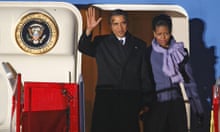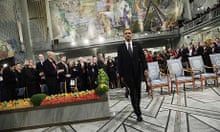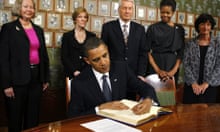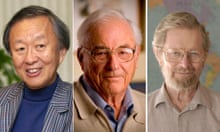1.27pm GMT: There will be war, but we can still strive for peace … that's the hope of all the world, Obama says. And with that, he's finished. The audience stands and applauds. Not a bad speech for a man who's only just stepped off the plane after a seven-hour flight. It's the speech that people in the audience will have wanted to hear; it was full of uplifting sentiments yet addressed some of the issues he must confront – war in Afghanistan, difficulties in the Middle East, Iran and North Korea. That's it for now. Thanks for all your comments.
1.25pm GMT: The president talks of the use of religion to justify violence, arguing that holy war is not a just war – it's a warped view of religion. He quotes the US civil rights leader Martin Luther King: "I refuse to accept despair as the final response to the ambiguities of history." The audience applauds his appeal for people to remember the sense of faith and hope of King and Indian independence campaigner Mahatma Gandhi.
1.19pm GMT: Obama defends his policy of engagement with oppressive regimes, citing Nixon's engagement with China and Pope John Paul's engagement with Polish communists. "The absence of hope can rot a society from within." Obama states that the freedom from want is a human right. On climate change, he delivers a slap to sceptics by saying there is widespread agreement about global warming among scientists.
1.14pm GMT: Regimes that break the rules must pay the price, Obama says in a statement probably aimed at Iran. He says he is acting with Russia to reduce nuclear stockpiles and mentions Iran and North Korea. "Those who seek peace cannot stand idly by when nations arms themselves for war." He says there must be consequences for those who carry out abuses in Sudan and Congo and stresses the importance of the postwar declaration on human rights. He rejects the assertion that human rights is a western idea. Obama says oppression leads to violence and, with shades of George Bush, states that America has never fought against a democracy. Yes, America respects different cultures, but it will support the oppressed – those who protest in Iran, the Burmese opposition leader Aung San Suu Kyi. "These people have us on our side."
1.09pm GMT: He says he believes force can be justified on humanitarian grounds, such as in the Balkans. In a complex world, he says, America cannot act alone and cites the example of Afghanistan. Nato remains indispensable and is the reason why countries honour United Nations peacekeepers. As for the means of waging war, Obama says there are certain codes of conduct and "America must remain a bearer of standards". He receives applause on pointing out that he has closed the Guantánamo Bay detention camp.
1.03pm GMT: Obama cites Kosovo in his defence of past US military action as enlightened self-interest: "Instruments of war have a role in preserving the peace." Says war is never glorious and should not be trumpeted as such. All nations must adhere to standards governing the use of force, he says, asserting that the US enjoys international support over its Afghanistan mission because of the September 11 terrorist attacks in 2001.
12.57pm GMT: We need to think of new ways of waging just war, Obama says. "I face the world as it is … Make no mistake, evil exists in the world." This is where he is justifying his actions in Afghanistan.
12.56pm GMT: Says one war [in Iraq] is winding down but the other one [in Afghanistan] is continuing; one he didn't start. "I'm acutely aware of the costs of conflict."
12.52pm GMT: Talks about the concept of a just war: the use of proportionate force, not harming civilians. Points out that the concept has been regularly ignored in the past. America led efforts to build an architecture to contain war.
To a large extent peace efforts have succeeded, there has been no third world war. But the old architecture is buckling under new threats. Proliferation may increase the risks of catastrophe. Wars between nations have given way to wars within nations.
12.50pm GMT: Obama is finally speaking. Says he is receiving the prize with deep humility and gratitude. Titter in the audience as he speaks of the controversy the award has generated. Admits his accomplishments are "slight".
12.40pm GMT: Obama also gets more than $1m (£614,000), which he says he will give to charity. Obama is nodding, acknowledging the applause. But he is not speaking yet, he's got to listen to some jazz.
12.36pm GMT: Chopin is over, now it's the main act. Applause as Obama receives the gold medal. The audience is on its feet.
12.34pm GMT: Thorbjørn Jagland is the name of the Nobel committee chairman.
12.27pm GMT: "Today another American is trying to renew internationalism" – the chairman is giving another reason why Obama won the award. Obama has the audacity to hope – that's what makes him important. "We need a global response to global challenge." That's it for the chairman. Piano interlude now – it's Chopin – then Obama will take the stage.
12.25pm GMT: When Martin Luther King received his prize there was still a long way to go to achieve his dream, the chairman says – an implicit rebuttal of those who have accused the committee of premature award-giving.
12.24pm GMT: I'm watching live coverage on al-Jazeera now, as Sky broke off for MPs' expenses. No carping commentary here. Just straight coverage of the chairman's speech.
12.20pm GMT: The chairman is moving on to climate change. Says Obama has come up with concrete proposals that might lead to a global agreement, if not this year then next year. He praises Obama's conciliatory policy with China. This will avoid confrontation, he says.
12.14pm GMT: Obama has improved the atmosphere for negotiations on a new strategic arms agreement, the committee chairman says, as he goes through a list of things that the US president has done to merit an award.
"President Obama has sent his signal to the world." You've got to sympathise with Obama having to sit through this stuff to get his award. It must be hard for him to stay awake.
12.11pm GMT: The committee chairman says Obama has already lowered the temperature of the world, quoting Desmond Tutu, a former Nobel laureate.
The chairman says Obama has done more than anyone in the past year to promote peace. Bronwen Maddox, the Times commentator, who is speaking on Sky, says it sounds painful listening to this.
12.09pm GMT: This from the Nobel website:
The peace prize is presented by the chairman of the Norwegian Nobel committee in the presence of the King and Queen of Norway, the government, and an invited audience. Several hundred seats are reserved for persons with special reasons for wishing to attend the ceremony.
12.05pm GMT: Sky is doing live coverage of the ceremony. A Norwegian soprano is singing Grieg's Good Morning. Perhaps Obama is right to dodge some of the events; it's going to be wall-to-wall ceremonies and the man must be exhausted after his overnighter on Air Force One.
12pm GMT: My colleague Gwladys Fouché reports that Obama, in the opinion of one PR expert, has come across as arrogant because he has cancelled so many events.
Security is extremely tight, she says. "Oslo police who don't usually have weapons on them will be carrying guns during Obama's visit."
11.52am GMT: Obama has been talking to reporters, and Afghanistan is very much on everybody's minds.
He says the withdrawal of US troops, set to start in 19 months, will be gradual, and US aid will last for years.
"We're not going to see some sharp cliff, some precipitous drawdown," Obama is quoted as saying by the Associated Press. "Several years after US combat troops have been drastically reduced in the region, the Afghanistan government is still going to need support for those security forces.
"We are still going to have an interest in partnering with Afghans and Pakistanis and others in dealing with the remnants of terrorist activities there.
"The pace at which that takes place, the slope of a drawdown, how it occurs tactically, those are all going to be conditions-based," just as there has been "a constant monitoring of the situation" in Iraq.
11.13am GMT: Obama's first stop on a chilly, damp day was the Norwegian Nobel institute, where he was teased by his wife, Michelle, for taking so long to sign the guest book.
Obama told reporters he had thanked committee members while noting the pictures of former winners filling the wall, singling out Martin Luther King.
Obama said the prize, given to the civil rights leader in 1964, increased King's stature in the world and had a "galvanising effect" for his cause at home.
The US president – the fourth American head of state to be so honoured after Theodore Roosevelt, Woodrow Wilson and Jimmy Carter – will be hoping some of the Nobel magic rubs off on him.
First off though there will be anti-war protesters, who are expected to turn out in force in Oslo to reinforce the message that receiving a peace prize sits uneasily with someone who is escalating a war. Protesters have already plastered posters around Oslo featuring the image of Obama from his iconic campaign poster, posing the question "Change?".
The Nobel committee's decision to award the peace prize to Barack Obama caused consternation. Many people wondered whether the US president deserved it with few accomplishments under his belt. Even controversial past winners could point to concrete successes. Henry Kissinger jointly won the award in 1973 with Le Duc Tho for negotiating the Paris peace accords. Tho had the decency to turn it down, not so Kissinger. Some thought Obama should have declined the prize too.
Perhaps anticipating charges of indecent haste in giving the prize to Obama, the Nobel committee said: "Only very rarely has a person to the same extent as Obama captured the world's attention and given its people hope for a better future." Yet there is no escaping the uncomfortable juxtaposition of a peace prize ceremony and Obama's recent decision to send an extra 30,000 troops to Afghanistan.
The New York Times reports that at a banquet tonight Obama will address the paradox in an acceptance speech that he was working on during the seven-hour flight from Washington. Quite apart from that, issues of protocol have clouded the visit, with many Norwegians miffed that Obama will not be attending many of the events surrounding the award, particularly a lunch with the king of Norway.





Comments (…)
Sign in or create your Guardian account to join the discussion